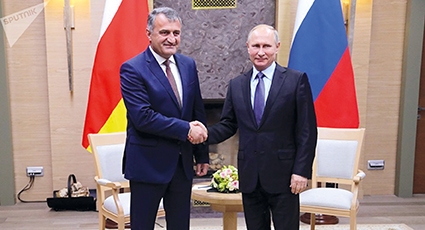Iran in Ossetia’s Election Narrative
Op-Ed
Along with the weekend “fun” in Tbilisi and Zugdidi, election fever has also taken over the breakaway territories. While the “presidential” elections in occupied Abkhazia are planned for July 22, the occupied South Ossetia is almost there, with elections to take place on June 9, in which locals will be electing 34 MPs to the so-called parliament. Of these, 17 will be elected from the party-list, while 17 will be majoritarian.
Traditionally, elections are a period of winning the hearts of voters and giving out promises like candy. Neither of the occupied territories are an exception to this norm, seeing candidates giving out a myriad of promises to Tskhinvalians- from creating jobs to a 10x increased income.
The issue of the August War 2008 and “aggression” of Tbilisi still dominate the narrative, with de-facto President Anatoly Bibilov and his party United Ossetia especially concentrating on it. Bibilov has also begun weaving a variety of fairytales, for instance promising voters he will “transform Tskhinvali into a Geneva.” Just a few days ago, Bibilov shared sensational information with the Iranian TV broadcaster about the somewhat bizarre connection between Ossetians and Persians: “The people of the state of Iran are close to Ossetians. Our languages belong to the Indo-European languages. We have many things in common, tragedy among them.” Although, Bibilov has yet to reveal the source where he read the Persian tragedies that inspired this announcement, it is clear just why he would say it. Bibilov started actively referring to the theme of Iran after visiting Moscow and meeting with Putin in the Kremlin, where he must have received some guarantees about his victory in the upcoming elections. Since then, Bibilov has appeared confident that the Islamic Republic of Iran will be the fifth country after Nicaragua, Nauru, Venezuela and Syria to recognize the independence of the occupied South Ossetia.
“It would be nice to strengthen our relations with Iran. We have made attempts and will continue to do so in future. We want Iran to finally recognize the Republic of South Ossetia,” Bibilov told Tskhinvalians, in an attempt to give them hope.
From the end of 2013, Alexey Filatov served as the Russian President’s chief advisor in CIS country issues and the Kremlin's curator for political processes in South Ossetia and Abkhazia. Now, the political life in the region is coordinated by Vladimir Vladimirov and the social and economic issues have other curators: from the Kremlin, assistant to Filatov, Denis Travin and from the Russian government, the deputy of the head of construction and regional development Vitaly Mutko.
Political subjects who fail to coordinate their ambitions with the curators are hailed as “uncontrollable,” hence regarded as a threat. Importantly, before travelling to Moscow, Anatoly Bibilov met the leaders of the political parties who will be taking part in the so-called parliamentary elections. At the meeting, Bibilov called on them to avoid “non-constructive criticism” during their meetings with the electorate and to discuss “only the real issues.” Whether the opposition in Tskhinvali creates discomfort for him, and how this could be connected with his frequent visits to the Kremlin before the upcoming elections, is unknown. However, expert in Caucasus issues Mamuka Areshidze thinks that: “It is less likely that the local opposition in Tskhinvali can change the political weather, as the situation is completely controlled by the occupational regime. Bibilov’s frequent visits to Moscow could be connected with raising his prestige as a political leader in the eyes of the local population, rather than any ‘fear’ of his competitors.” It seems that Bibilov is not regarded as headstrong, hence presumably received the relevant instructions from Russia. What the Kremlin guarantees with regards Iran were is also unknown, but clearly the issue has come to the forefront, which can’t be a mere coincidence, further proven by the events that developed in the Persian Gulf.
Iran has refused to fulfill certain terms of the agreement reached with the international community in 2015 regarding nuclear issues. Iran’s President Hassan Rouhani declared that if the leading world countries will not protect Iran from the US sanctions, his country will resume high level exploitation of Uranium. This statement was broadcasted by the state channel on May 8. After the threat, the US Secretary of State, Mike Pompeo, cancelled his visit to Germany and instead visited Iraq. He held meetings with Iraqi political leaders and discussed the recent rising tensions with Iran.
Whether what Bibilov said is a Kremlin message about whom Russia will back in the Persian crisis is not clear right now, but it is obvious that the issue of Iran in Bibilov’s election narratives is not coincidental.
By Zaza Jgarkava












